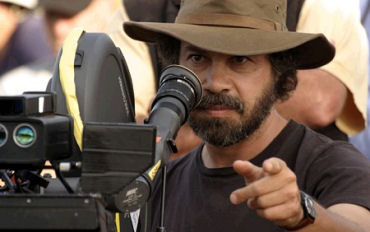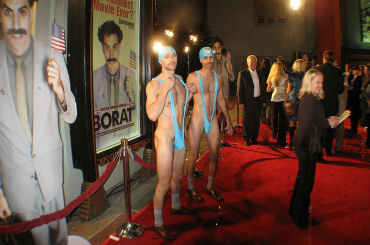All the purchase of ThinkFilm by Capitol Films means is that L.A. entrepreneurs David Bergstein and Ron Tudor have now expanded their way into the U.S. indie film distribution scene, having already established themselves in England by owning the U.K.-based Capitol Films. (Oddly, Capitol has Bordertown, that crackling Jennifer Lopez drama about the unsolved Juarez murders that no one will pick up, on its website — kind of an industry advertisement that says “we pick up shit nobody else wants!”) The upshot is that ThinkFilm (which will hang onto its name and retain all of its staffers) will now have more money to be more competitive with. Capitol also holds rights to the recently-wrapped Sidney Lumet drama Before the Devil Knows You’re Dead, which has no U.S. distributor.
Month: October 2006
Cruise, Redford, Afghanistan
I tried to think of something interesting to say about TomKat planning to finally get married in Italy on Saturday, 11.18, but all I could come up with was the idea of being inside their heads for five or six hours via one of those Being John Malkovich mud-tunnel transporting devices, or even being in both their heads simultaneously (weird thought), but it got too strange.
The intrigue is much higher regarding Cruise’s interest in making an indie “political drama” called Lions for Lambs, which reportedly deals with a platoon of U.S. soldiers in Afghanistan, presumably post-9/11. The script is by Matthew Carnahan (State of Play), and Variety’s Michael Fleming says Robert Redford is said to be “likely” to direct as well as play a role. If anyone has a copy….
“Blood” intentions
The more you hear about a film that presents a humanistic portrait of an afflicted people and their oppressors, and the more you hear about a director’s humane, liberal views about the social particulars behind the film or that were used as a kind of socio-textural backdrop during its making, the more curious…okay, suspicious you are about how the movie plays by regular-guy, hang-the-politics standards.

Blood Diamond director Ed Zwick isn’t exactly the Stanley Kramer of his time but he sounds like Kramer, a ’50s and ’60s Hollywood liberal who made socially- minded films with liberal philosophies, in this phone interview with Nikki Finke, and the more I read it, the more I smelled liberal smoke.
Zwick was looking to quash a negative rumor that he and the film’s big-name stars — Leonardo DiCaprio, Jennifer Connelly, Djimon Hounsou — promised to supply prosthetic limbs for some teenaged orphans and child amputees from South Africa’s South Zulu Nataal and Mozambique’s Maputo, where the film was shot, and then reneged and took off back to the States. “This is a very cynical and appalling tack to take and in the worst taste, especially given what we all tried to do while we were there.” Zwick said in a phoner from London. “What I do think is this is the work of someone who clearly bears the film ill will.”
The long and the short is that Zwick, DiCaprio, Connelly, Hounsou, other cast and crew members plus “producers like Paula Weinstein” coughed up some change (i.e., presumably several grand each) that went into a fund, and then Warner Bros. matched. it The “Blood Diamond Fund” came to somewhere between $200,000 and $500,000, Finke reports.
It was just a drop in the bucket but a humane thing to do all around, etc., even if, when you get right down to it, prosthetic limbs haven’t in fact been purchased with the donated funds.
The money went to a lot of needy causes, but the people charged with assessing needs and where to invest the money haven’t yet specificaly bought any prosthetic limbs. “The fund has gotten to a number of things on the list,” Zwick tells Finke, “but there’s more to go. And in the list of things to do, prosthetics are part of that list.”
Bottom line: Zwick, Hounsou, DiCaprio, Connnelly, Weinstein, et. al. are good people who did the right thing, but be wary of Blood Diamond because of the above-mentoned equation. I’ve heard from a guy who’s seen it. He didn’t call it problematic in any kind of pronounced way — he mainly said not bad, pretty good, etc. — but he did say it was very Zwick-y.
Fatties vs. Jabbas
Go to the site for Paul Feig‘s Unaccompanied Minors (Warner Bros., 12.8) and right away you’re thinking 180s, escape routes, avoidance patterns. The cast list tells me they’ve got Brett Kelly (Bad Santa) costarring as Beef Welllington, in the part of the morbidly obese kid, which every comedy seems to have these days. Morbidly obese people used to be oddities — in today’s culture young kids who are probably fated to die of a heart attack by the time they reach 50 are totally commonplace.
To me fatties have always been kind of chuckly, but there’s something deeply unfunny about Jabbas. For centuries corpulence has been regarded as a sign of jolliness, indulgence, mischievousness or a little sadness, which makes it natural and easy to laugh at fat guys (John Candy, John Belushi, etc.). But morbidly obsese types are generally seen (whether people want to admit it or not) as people with a major problem — undisciplined lardbuckets, avatars of sloth. I’ve noticed, by the way, that Ethan Suplee is no longer m.o. but merely fat. Good work, dude… keep it up. Word is he got a staple job.
Three Foreign Language Champs
I thought I had linked to Nathaniel R.‘s comprehensive rundown of all the Best Foreign Language feature submissions on Film Experience. Well, I have now. ’06 will be a bitch as far as playing favorites since the three top foreign-language contenders — Florian Henckel von Donnersmarck‘s The Lives of Others (Sony Pictures Classic, 2.9.07), Guillermo del Toro’s Pan’s Labyrinth (Picturehouse, 12.29 — submitted by Mexico, shot in Spain) and Pedro Almodovar’s Volver (Sony Pictues Classics, 11.3) — are equally major, exceptional, transporting. I worship each one and there’s no choosing — all three should take home the prize.
City of ghosts
“The Daisy on Rodeo Dr., the MLK diner on Wilshire Blvd. where we all used to go at 2 in the morning, the Luau on the corner — they’re all gone. All the time I’m passing places that were part of my history here but they’re not there now. I’m walking down the street and seeing things and people that only I can see. The town is full of ghosts for me. Frank Sinatra was a friend. Fred Astaire, Danny Kaye…they’re no longer here.” — The Prestige costar Michael Caine speaking to the Toronto Star‘s John Hiscock, and posted three bloody days ago.
Reporter re-design
The online re-design of the Hollywood Reporter, which went up three days ago, has resulted in something that doesn’t have much of a pulse. It’s hard to put your finger on it exactly, but somewhere on high the ghost of Billy Wilkerson is scrunching his face and going, “Whaaat?” A Hollywood trade paper needs to throw in some hot licks and boogie it up some — it can’t be too corporate-looking or it won’t look like a Hollywood trade paper. Honestly, this new thing could be a website for some Midwest furniture manufacturer or ice-cream distributor. The recent Variety re-design was agreeable, but this one isn’t — it needs to say “film capital of fthe world” and it doesn’t.
One of my all-time favorite Charles Bukowski lines is about how if you live in this town long enough “the stink of L.A. gets into your bones.” That’s what the new Reporter design lacks — the aroma of particular history. The entire world has been molded by the culture that arose out of the L.A. entertainment industry (however lacking or unwelcome this may seem to some). Hollywood has always been fueled by primal appetites and crazy dreams and schemes, but you’d never know it by looking at this.
Andersen on dying Times
Writing in his New York magazine column (i.e., “Imperial City”), Kurt Andersen has explained and nailed what I’ve long hated about the L.A. Times (except for some of the Hollywood coverage): “L.A.’s liberalism remains far more circa-1975 paleo than New York City’s, and the L.A. Times‘ journalism, which tends toward the dull and the earnest, reflects that. Racking up Pulitzer Prizes — the paper’s won fourteen in the last six years — doesn’t mean that a paper is exciting or essential to its readers, and can even be a contraindicator.
“The notion that tedious worthiness equals substance and importance and vice versa is compensation for the elites’ anxiety about the very L.A.-ness of L.A. — sun, fun, show business, too few intellectuals and crowded sidewalks, too many fake breasts and self-confident dumb people.”
The column was prompted, of course, by the Times‘ circulation shrinkage and the various contractions that have resulted:
“Most newspapers are dinosaurs, certainly as newsprint creatures, facing extinction sooner rather than later. Our cretaceous era is ending,” Amnderson recaps. “But the Los Angeles Times is the Brachiosaurus of its genus. In 1990, it had a daily circulation of 1.2 million, as big as [the N.Y.] Times. Today, it’s down to 850,000, and the decline has accelerated since 2000, when the Tribune company bought the paper.
“Naturally, Tribune executives in Chicago have wanted to cut expenses accordingly. And naturally, people at the paper hate the perpetual game of musical chairs. Last month, editor Dean Baquet publicly refused to go along with any further layoffs, and Jeff Johnson, a Tribune lifer who had been his publisher for only a year, publicly supported him. ‘Newspapers,’ Johnson was quoted in an article in his own paper, ‘can’t cut their way into the future.'”
Tedious worthiness! That’ll hold me for a few days.
Borat pics
It was great to finally see Borat: Cultural Learnings of America for Make Benefit Glorious Nation of Kazakhstan (20th Century Fox, 11.3), even if it was on a very gracious, Russian-potato-line, second-class invitee basis.
Invited guests to last night’s premiere were made to wait in a totally non-moving line on Hollywood Blvd. last night for a very long while, and while it was hardly painful or humiliating — it was a nothing, a shrug-off — this sort of thing never happens at a premiere. The usual drill at any premiere is to walk up to will-call, get your ticket and go inside and grab a bag of popcorn. Nobody could figure out the delay but the general sentiment was one of vague irritation and “why?” And then we were kept waiting another half hour or so once we were in the theatre and seated.
Borat is fall-on-the-floor funny. Hilarious, outrageous, brilliant, diseased. It’s true about it being a slash-and-burn satire of American yahoo-ism. If red-staters are good sports they’ll laugh along with everyone else, but some devotees of the Pentecostal faith are probably going to have concerns. The mock anti-semitism is inspirational; I loved the throwing of dollar bills at the Jews disguised as cock- roaches. And the naked wresting scene is without question the single most appalling thing I’ve seen in a film in years. Make that decades. And thass okay! I like it!
Borat star-producer-writer Sacha Baron Cohen spent an hour (longer?) talking to electronic press people on the red carpet. Journalists like myself and the Holly- wood Reporter‘s Borys Kit and N.Y. Times reporter Sharon Waxman didn’t get to attend the premiere showing at the big Chinese theatre — we were shunted off to an upstairs theatre at Mann’s Chinese 6.
Variety reported that the plan was for Cohen “to be ushered into his preem by a phalanx of Kazakh locals bearing fruits and wonders of the country. Plans were for ‘Borat’ to be carried, bridelike, to the podium by an oversized woman. There, he would address the throng of press and fans and respond to a recent invitation to visit Kazakhstan, which has tried to disown Borat almost from the moment he claimed it as his country of origin.”
Another “Borat” tracking story
Variety‘s Michael Fleming and Ian Mohr have run the third significant story about how Borat‘s tracking isn’t all that terrific (“Kazakh Quandary”), following Nikki Finke‘s Deadline Hollywood Daily 10.17 piece and my own 10.19 article on this topic. Oh, yeah…Poland ran something also.
“While Borat has benefited from a wave of crackling Internet buzz, strong reviews and knockout festival screenings, Borat hasn’t registered as strongly in tracking reports,” Fleming/Mohr have written. “So far, it has scored below rival fare, from Catch a Fire to Babel, in audience awareness. But Fox maintains standard tracking methodology doesn’t apply. ‘This is a new genre of movie,’ said Jeffrey Godsick, exec vp marketing for 20th Century Fox. ‘The awareness is beginning with a targeted audience. When you are breaking a new kind of genre, not everyone knows what to make of it.'”
The way I put was that “it goes without saying that awareness and interest levels are through the roof with media, industry, ubers and early-adopter types but otherwise it’s looking like it may be a little too hip for the room, ‘the room’ being pretty much everyone else. Maybe Sacha Baron Cohen‘s goofy-dry put-on humor only travels with a certain clientele. Maybe people are starting to hear that Borat is basically about Cohen’s Kazakhstan culture reporter goofing on Middle Americans and maybe that’s not going down so well with some. Or maybe they just haven’t tuned in yet.”
The Variety story quoted “a rival studio distribution exec, who attended a recent Borat screening that was part of the buzz-building Los Angeles Blackcarpet screening series organized by MySpace.com, described audience reaction as nothing less than manic. Lines snaked around the block. Kids, dressed in Borat garb, took to a mike positioned in front of the auditorium to do their best impersonations.”
Fleming-Mohr also wrote that while “skeptics pointed to the internet-hyped Snakes on a Plane as a reason for caution, others noted that while Snakes was slammed by critics, Borat has received glowing notices so far.”
Turkeys in a field
“With a multitude of highbrow movies competing for the same adult audience” during the fall-holiday Oscar season, “film after film takes a nasty tumble,” writes L.A. Times industry columnist Patrick Goldstein. His piece refers more to last year’s wipeouts than this year’s, understandably. It seems fairer to let the fate of pedigree movies like Stranger Than Fiction find realization by God’s awful grace.
“Last year, for example, a host of movies tanked at the box office despite being touted — either by the studios or some breathless Oscar prognosticator — as having Academy Award potential. A partial sample includes Jarhead, Memoirs of a Geisha, The New World, North Country, Casanova, The Producers, Elizabethtown and In Her Shoes.”
The hauntingly beautiful forest primeval nebulousness in Terrence Malick‘s The New World made it seem like a doomed proposition from the start. (Because it was too self-importantly unto itself and romantically unsatisfying to boot.) Like- wise, everyone knew from the get-go that Lasse Hallstrom’s Casanova was too light and confection-y. And I still choke up over the failure of Curtis Hanson‘s In Her Shoes to get any Oscar traction. Talk about inexplicable. I still think that film is teeming with the right stuff, especially given the perfect performances by Toni Collette, Mark Feuerstein and Norman Lloyd.
But Geisha, Jarhead. North Country and Elizabethtown came out asking to be picked off, like wild turkeys in an open field. And I still feel very satisfied — I can even say comforted — that I was part of the team that took down (or at least helped to take down) Munich.
“Some of these movies would undoubtedly have failed no matter when they were released,” Goldstein writes. “But I’d argue that many of them would’ve had a better chance for survival if they’d had a chance to find an audience in a less competitive environment. In the fall, the bar is perilously high: Every movie is graded on an Oscar curve instead of being judged on its own merits. If some of these movies had been released in a quiet weekend in the spring when quality-starved adults had nothing else to see at the multiplex, they might have had a fighting chance for survival.
“This year the Oscar Follies are back. I’m sure every studio chief believes he or she is simply doing what’s best for the film’s box-office chances, since a best picture nod often gives adults an added incentive to see a serious movie. Unfortunately, of the 25 or so adult movies jammed into the last 12 weeks of the year, only five will get one of those cherished nominations. The rest will be orphans, ignored instead of adored, left to wither on the vine when all the free media hype goes to the five lucky nominees.
“The problem is simple enough: No one wants to tell a hotshot filmmaker — or admit to him or herself — that a film isn’t good enough to compete. Instead the studios put the blame on us, claiming that we won’t support any serious movies the other 40 weeks of the year. But the real reason all these good movies are coming out at exactly the same time is because everyone in Hollywood is smoking the Oscar crack pipe.”
Black, piracy, “Destiny”
It’s been on YouTube a little while, but here’s the latest celebrity hipster put-on: Jack Black delivering an anti-piracy message disguised as a plug Tenacious D in ‘The Pick of Destiny’ (New Line, 11.17).


